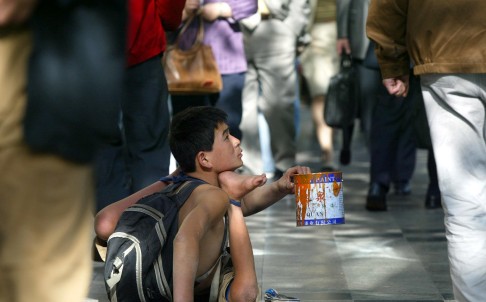Criminal gangs 'crippling children and forcing them to work as beggars'
PUBLISHED : Wednesday, 19 March, 2014, 7:29pm
UPDATED : Thursday, 20 March, 2014, 9:30am
Chris Luo [email protected]

A disabled beggar begs for alms from passersby along a street in downtown Shanghai. Photo: AFP
Criminal gangs in the Guangdong industry hub of Dongguan have been enslaving large numbers of physically disabled children, and forcing of them to work as beggars on the street, according to reports.
The criminal organisations, dubbed “beggar gangs”, keep the children in captivity, provide only minimum rations to keep them alive and pocket any money earned by the children as beggars, a 30-minute a Phoenix TV investigative report revealed, citing multiple accounts.
In extreme cases they even cripple healthy young children to elicit more sympathy from passers-by, the report said.
Wang Xiuyong, who was close to the head of one of the beggar gangs, said the gang members would each morning drive vans loaded with disabled beggars and drop them off at crowded locations around the city, keeping them under close supervision.
At the end of each day, the children would be picked up, have their earnings confiscated and returned to captivity in secret locations.
Most of the beggars were disabled children – many of them limbless or suffering from gruesome wounds – who had been stolen, abducted and even “rented” from their hometowns and brought to Dongguan for this profitable “business”, Wang – who is himself physically disabled – was cited as saying.
“The more severely handicapped they are, the more valuable they are,” Wang said.
“The more gruesome their wounds look, the more money they can make [by begging]”.
In some cases gang members would deliberately disable healthy children, Wang said, recalling how he witnessed gang members breaking the legs of a homeless infant girl they found on street.
Older children in the beggar gangs were often forced to consume strong sleeping pills to keep them unconscious throughout the day while they were being used as props for begging, Wang said.
Wang said he reported the beggar gang to police in Shijie, a district of Dongguan, but was turned away by officers who said aid stations under the Civil Administration Department were responsible for issues relating to begging activities.
An official of Guangdong provincial police department whose surname is Zeng said the authority has acknowledged the media reports and is investigating the alleged crimes.
“Any criminal activities involving begging are definitely fall under the jurisdiction of the police,” Zeng told the South China Morning Post in a telephone interview.
The programme also highlighted the plight of a young migrant worker called Lu Jianqiu who was enslaved as a beggar for more than 10 years after he was doped, abducted and then crippled by gang members.
Lu’s cousin said in the programme that she learnt about his situation when she briefly met him on Dongguan street before he was quickly taken away by nearby gang members. His relatives and friends had been desperately searching for him said they have never seen him again since.
